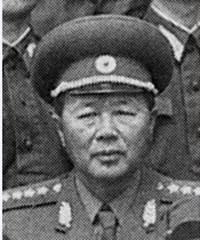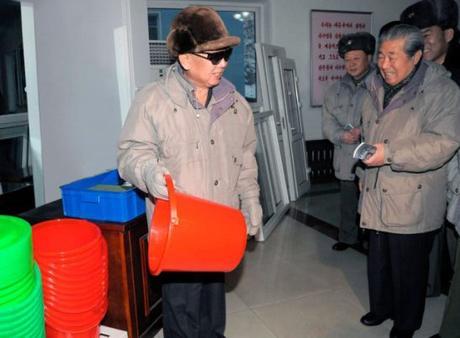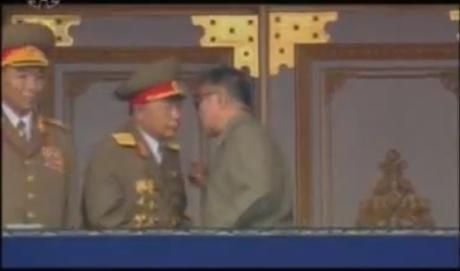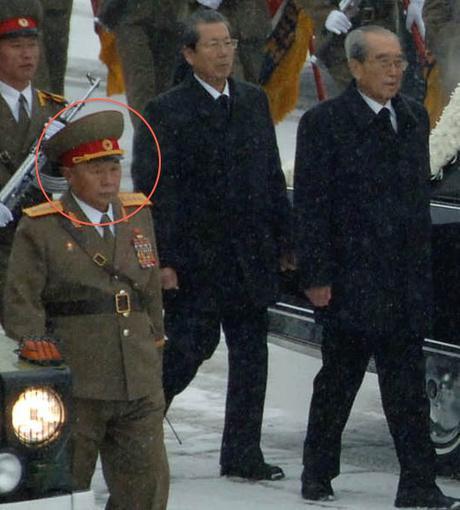
General Kim Myong Guk
Former 1st Vice Chief of the Korean People’s Army [KPA] General Staff and Director of the General Staff Operations Bureau, General Kim Myong Guk (Kim Myo’ng-kuk) passed away in Pyongyang over the weekend. General Kim was also a former member of the Workers’ Party of Korea [WPK] Central Committee and the WPK Central Military Commission.
General Kim held several unit command positions in the KPA infantry during the 1960s and 1970s. In the 1970s he served as a lecturer in Strategy and Tactics Faculty of Kim Il Sung Military University and later became Chief of Staff of the April 25 Training Facility. In 1984 he was appointed head of the KPA General Staff Operations Bureau Training Department. He was elected an alternate (candidate) member of the 6th WPK Central Committee at its 16th plenary session held during June 7 to June 9, 1989. The next year he was elected to his first term of office as a deputy to the Supreme People’s Assembly.

Kim Myong Guk (background, right) with KJI on a February 2010 guidance visit in Kangdong County, Pyongyang (Photo: NK Leadership Watch file photo).
Kim Myong Guk was elected to full membership on the 6th WPK Central Committee during its 19th plenary session on December 24, 1991. This same plenary session saw a number of top KPA and security officials elected to the Party Central Committee including General Kim Kyok Sik [Kim Kyo’k-sik] (who would serve as Chief of the KPA General Staff and Minister of the People’s Armed Forces), Colonel-General Kang Tong Yun [Kang To’ng-yun] (who would serve as a corps commander before migrating to the WPK Organization Guidance Department as a deputy director) and General Ju Sang Song [Chu Sang-so’ng] (who would serve as IV Army Corps Commander and Minister of the People’s Security). These elections were part of forming a political base of support in the conventional armed forced for late DPRK leader, Kim Jong Il [Kim Cho’ng-il], who was elected KPA Supreme Commander during the plenary meeting. The day after the meeting KJI and Kim Il Sung [Kim Il-so’ng] would attend a meeting of the KPA high command along with officers and service members of the KPA General Political Department; during that meeting, KPA officers and service members swore oaths of loyalty to the late DPRK leaders.
In 1994, General Kim was appointed Director of the KPA General Staff Operations Bureau. In that position, General Kim was responsible for the daily operational management, planning and training of the DPRK’s three service branches and coordinating the training and activities of the Ministry of the People’s Security, the Guard Command, the reserve military training units and the Pyongyang Defense Command. In 1995, General Kim became a member of the WPK Central Military Commission. He headed the KPA General Staff Operations Bureau until around 1996 when he was replaced by Ri Myong Su [Ri Myo’ng-su], who currently serves as Chief of the KPA General Staff. General Kim became commander of the 108th Mechanized Corps. The Mechanized Corps links directly with the Supreme Command during contingencies. At the time he assumed command, the VI Corps coup attempt had been quelled and the 108th Mechanized Corps was tasked with providing an outer layer of security defending Pyongyang and the central leadership from a military power challenge from the Hamgyo’ng Provinces, and providing support to the Pyongyang Defense Command and Guard Command protecting the capital city. General Kim remained a close military aide and advisor to KJI and retained his positions on the Central Military Commission and Party Central Committee.

Kim Jong Il confers with Gen. Kim Myong Kuk during a parade of Worker-Peasant Red Guards in central Pyongyang on September 9, 2011 (Photo: NKLW file photo/KCTV).
Kim Myong Guk was re-elected to the Supreme People’s Assembly in 1998 and 2003. In 2007, he returned to the KPA high command for his second tenure of office as Director of the KPA General Staff Operations Bureau. His appointment occurred as part of personnel changes undertaken to cope with the expansion of the bureaucracy and authority of the National Defense Commission. It also occurred when Kim Jong Un (Kim Cho’ng-u’n) began his formal career in the power center, and was focused on military and security-related matters. Between 2009 and 2010, General Kim was temporarily demoted from General to Colonel-General. He was retained on the WPK Central Committee and the WPK Central Military Commission during the 3rd Party Conference on September 28, 2010. General Kim was a member of Kim Jong Il’s Funeral Committee in December 2011 and during the funeral he directed the funeral procession in Pyongyang.

Gen. Kim Myo’ng-kuk (highlighted) clutches a radio while directing KPA officers and service members during KJI’s funeral cortege on December 28, 2011 (Photo: NKLW/KCNA)
General Kim effectively retired from office in 2012. Despite his retirement he continued to appear at public events until 2015.
Kim Myong Guk was born in 1940 and attended Mangyo’ngdae Revolutionary School and later attended the Frunze Military Academy in Russia. His effective promotions included: Lieutenant-General in 1982, Colonel-General in 1994 and General in 1995. He was the recipient of the Order of Kim Il Sung and the Order of Kim Jong Il, among other state and army awards, titles and decorations. According to some sources, General Kim was a member of the extended Kim Family. He began serving as a military tutor and advisor to Kim Jong Il starting in 1980. He was part of a small group of senior KPA officials who were permitted to carry loaded guns in close proximity to the late DPRK leader. Along with the late VMar Jang Song U [Chang So’ng-u] (eldest brother of Jang Song Thaek) and former Minister of the People’s Armed Forces, Marshal Kim Yong Chun [Kim Yo’ng-ch’un], General Kim went on an extended hunting trips with Kim Jong Il. As head of the Operations Bureau, due to his ties to KJI and because of his position, KPA commanders who outranked General Kim were compelled to salute to him during field inspections. His relationship with KJI was so close, personally and politically, that the late leader referred to Kim Myong Guk as “my Operations Bureau Director.”
Filed under: 108th Mechanized Division, 2007-2010 kpa management, Central Committee, Central Military Committee, colonel general, corps command, corps commanders, Gen. Kim Myo'ng-kuk, Gen. Ri Myong Su, gsd, gsob, Guard Command, Guidance Tours, internal security, Kim Family, Kim Jong-il, KJI death, KJI Memorial Events 2012, KJI Personal Secretariat, Korean People's Army (KPA), Korean People's Army Supreme Command, Korean People's Internal Security Forces, Korean Workers' Party (KWP), KPA General Political Bureau, KPA General Political Department, KPA General Staff, KPA Large Combined Units, KPA Organization Department, KPA Party Life, KPA supernumerary organizations, KPA Supreme Command, kpif, ministry of people's security, Ministry of the People's Armed Forces (MPAF), MPAF GPB, National Defense Commission (NDC), NDC Administration Department, Organization and Guidance Department, PKSO Korea, Political Bureau, Pyongyang Defense Command, RMTUs, VMar Kim Yong Chun, Worker Peasant Red Guard, Young Red Guard
